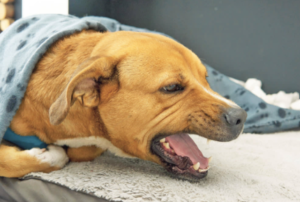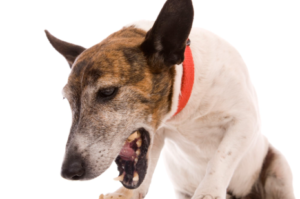Kennel cough, scientifically known as canine infectious tracheobronchitis, is a highly contagious respiratory disease in dogs. It’s a common ailment that can affect dogs of all ages, breeds, and sizes. This condition often occurs in places where dogs congregate, such as kennels, dog parks, or grooming salons. Understanding the causes, symptoms, and treatment of kennel cough can help pet owners take proactive measures to ensure their furry friends stay healthy.
What Is Kennel Cough?

Kennel cough is a respiratory infection that affects the trachea and bronchi of dogs. It’s similar to a cold in humans but can range from mild to severe. The condition is caused by a combination of infectious agents, including viruses and bacteria.
Read this article also: My Dog is Coughing Up Blood
Causes of Kennel Cough
Kennel cough is often caused by a combination of:
- Bordetella bronchiseptica: A bacterium that is a primary cause of kennel cough. Dogs infected with this bacterium are more susceptible to other viruses.
- Canine Parainfluenza Virus: This virus weakens the respiratory system, making dogs vulnerable to secondary infections.
- Canine Adenovirus Type 2: Another viral agent that contributes to respiratory illness.
Environmental Factors:
- Poor ventilation in kennels.
- Stress due to overcrowding.
- Exposure to cigarette smoke or other irritants.
How Does Kennel Cough Spread?

Kennel cough spreads through airborne droplets, direct contact, or contaminated surfaces. When an infected dog coughs or sneezes, it releases infectious agents into the air. Healthy dogs can contract the disease by breathing in these droplets or by coming into contact with contaminated objects like water bowls or toys.
Symptoms of Kennel Cough
The most recognizable symptom of kennel cough is a persistent, dry, hacking cough that may sound like a honk. Other symptoms include:
- Retching or gagging, especially after coughing.
- Nasal discharge.
- Fever (in severe cases).
- Loss of appetite.
- Lethargy.
It’s essential to monitor these symptoms closely. While mild cases may resolve on their own, severe symptoms warrant immediate veterinary attention.
Diagnosis of Kennel Cough
A veterinarian typically diagnoses kennel cough based on:
- Medical History: Exposure to other dogs in kennels or parks.
- Physical Examination: Listening to the cough and checking for other signs of respiratory distress.
Additional Tests (if necessary):
- X-rays to rule out pneumonia.
- Laboratory tests to identify the specific pathogen.
- Treatment Options
Rest and Isolation:
Keep the dog in a calm environment away from other pets to prevent spreading the infection.
Medications:
- Antibiotics: Prescribed if a bacterial infection like Bordetella is suspected.
- Cough Suppressants: To relieve severe coughing and improve comfort.
Supportive Care:
- Ensure the dog stays hydrated.
- Use a humidifier to soothe the airways.
- Encourage small, nutritious meals to maintain strength.
Severe Cases:
Hospitalization may be required if the dog develops pneumonia or severe respiratory distress.
Home Remedies for Mild Cases

While professional veterinary care is always recommended, some home remedies can help alleviate symptoms:
- Honey: A teaspoon of honey can soothe the throat and reduce coughing.
- Steam Therapy: Let your dog breathe in steam from a hot shower to clear nasal passages.
- Probiotics: Boost the immune system with probiotic supplements.
Preventing Kennel Cough
Vaccination:
The Bordetella vaccine is highly effective in reducing the risk of kennel cough. It’s available as an injectable, intranasal, or oral vaccine.
Hygiene Practices:
- Clean and disinfect shared dog spaces regularly.
- Provide good ventilation in kennels or homes.
Limit Exposure:
- Avoid crowded areas during outbreaks.
- Ensure your dog’s playmates are healthy.
Strengthen Immunity:
- A balanced diet and regular exercise can keep your dog’s immune system robust.
When to See a Veterinarian
Seek veterinary care if your dog:
- Shows no improvement after a week.
- Exhibits severe symptoms like difficulty breathing, fever, or loss of appetite.
- Has a compromised immune system, making them more vulnerable to complications.
FAQs about Kennel Cough
1. Is kennel cough dangerous?
Kennel cough is usually mild but can become serious in puppies, older dogs, or those with underlying health issues.
2. Can humans catch kennel cough?
It is extremely rare, but people with weakened immune systems might be at a slight risk of contracting Bordetella bronchiseptica.
3. How long does kennel cough last?
Mild cases resolve in 1-2 weeks, while severe cases may take longer with treatment.
4. Can kennel cough recur?
Yes, dogs can get kennel cough multiple times, especially if exposed to infected animals or environments.
Conclusion
Kennel cough, while common and often mild, can cause discomfort and stress for both dogs and their owners. By understanding its causes, symptoms, and treatment options, you can take swift action to protect your pet. Regular vaccinations, good hygiene, and prompt medical care are the keys to keeping your furry friend healthy and happy. If you suspect your dog has kennel cough, consult your veterinarian for proper diagnosis and treatment. Prioritizing your dog’s health ensures a long and joyful companionship.
